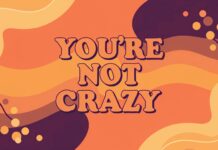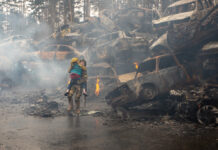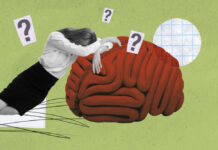I was about three years old when I first remember feeling that my mom may not be coming for me because I didn’t think she’d survive to live to see another day. She was addicted to drugs and alcohol, and I worried she wouldn’t wake up after passing out in the afternoons in our trailer on top of her black comforter.
I was eight or so when my cousin took me to church and I cried frantically in a hallway when I couldn’t find her after Sunday school.
I was 13 when my aunt was murdered and my mom cried the way I had when I was three.
I was 17 and coming home after a wonderful year as an exchange student when I left the line I was standing in at the airport and went running and screaming desperately for my host sister.
And I was 18 when my godmother overdosed in a bathtub, after having just seen her the day before at my grandpa’s birthday. I crawled under my college desk that day, placed my head in my hands, and cried alone for hours.
This year, I almost lost one of my mother figures to COVID-19. As she lingered on a ventilator for 25 days, I cried for this woman the way I had for my mother, host sister, and godmother—the way my mother did when she lost her sister. I don’t know why I reacted this way toward the thought of losing this particular mother figure from my childhood, but I did.
Therapists are quick to refer to this pain I feel as a “fear of abandonment,” as if it is a figment of my mind and something not worth the time to attend to.
Videos are posted online attempting to differentiate Borderline Personality Disorder (BPD) from Complex Post-Traumatic Stress Disorder (C-PTSD), and the number-one distinguishing characteristic of the former is this “fear of abandonment.”
I find this attempt to distinguish these two diagnoses by questioning whether someone like me has a fear of abandonment to be quite harmful. I don’t identify with the “borderline” label:
I’ve always had wonderful relationships.
I am not quick to become angry.
I do, though, struggle greatly with this loss of mother figures.
A few years ago, my therapist suddenly closed her practice in New York City after promising she had no intention of leaving for several years, and this pain of losing a mother figure reemerged.
It left me with a hole so vast that I struggled to get out of bed or go to school.
My light went out after losing her, and it didn’t come back until I found another therapist to fill my mother wound.
I worked with this next woman for a year and a half before it was suggested that I try Dialectical Behavioral Therapy (DBT), typically prescribed for treating Borderline Personality Disorder.
While I didn’t want to leave this therapist, who was filling the hole in the heart of my younger self, I trusted that this was the right approach for me and left thinking I could always return.
* * *
What I found was that DBT wasn’t attachment-focused.
Instead, the therapist had me buy a book and practice using tools.
There was no telling my story.
There was no relational piece to the therapy.
She even called me by the wrong name.
After some time, I realized this therapy wasn’t for me.
I didn’t need to regulate my emotions.
I needed to process this mother wound that continues to show up throughout my life.
I left DBT and attempted to return to my attachment-focused therapist, but she said our work was done and that was her choice.
Her words did more than sting.
They stabbed me in my deepest wound.
I was told once that what we struggle with shows up over and over again until we see it and work through it.
I went for a drive after work yesterday to step away from my room and attempt to come out of the hollowness that was eating me up inside.
As I drove, I thought a lot about this mother wound and thought back to every person who has ever filled this mother role whom I have lost.
I pulled over and began to cry.
I didn’t regulate any of my emotions; instead, I grieved the loss of all these beautiful women.
I then went home and made chocolate chip cookies with the help of the little girl inside me.
We danced.
We cuddled.
We put our hand on our heart and said, “I love you” to all our mother figures who have come and gone.
I write my story for anyone who can relate and also to bring awareness to this topic.
Some therapists may refer to this pain as a “fear of abandonment.” I don’t. Rather, I see it as a deep mother wound that requires a lot of care to heal.
To all therapists and psychologists, please be careful with the phrases you use and the diagnoses you hand out. Many with “fear of abandonment” are adults with painful childhood experiences that would be better classified under C-PTSD than the shamed diagnosis of Borderline.
Even better, let’s stop shaming adults with childhood trauma and labeling them as “disordered” in the first place.















“Even better, let’s stop shaming adults with childhood trauma and labeling them as ‘disordered’ in the first place.”
I couldn’t agree more, since covering up child abuse is the number one actual societal function of both the psychological and psychiatric industries, as well as the other DSM “bible” billers. Despite the fact that covering up child abuse is a crime.
https://www.indybay.org/newsitems/2019/01/23/18820633.php?fbclid=IwAR2-cgZPcEvbz7yFqMuUwneIuaqGleGiOzackY4N2sPeVXolwmEga5iKxdo
https://www.madinamerica.com/2016/04/heal-for-life/
And all this systemic child abuse covering up is by DSM design.
https://www.psychologytoday.com/us/blog/your-child-does-not-have-bipolar-disorder/201402/dsm-5-and-child-neglect-and-abuse-1
Thank you for sharing your story, Rebecca, since psychologists as a profession need to be seen as equally responsible for all this criminal child abuse covering up, as the psychiatric profession is as well.
Report comment
Rebecca, your therapists are “trained”. To mimic words.
You do not have a disorder anymore than they do.
There is something disordered about a lot and lots of therapy, they think
that is what they want to do, is therapy people.
You might always have a hole in that heart, a grief, it is part of you
and so what if it makes you run and scream
You are an evolving being. So are all the people in your life.
You might benefit by a “therapist” who bakes cookies with you, who takes you out camping or collecting rocks.
That is therapy and hopefully you find your community to do that with you.
Perhaps try mothering others also. Though don’t stress over it.
Psychology and psychiatry sure got everyone into a pickle. That is why it’s best to try to find community you can fit into.
Perhaps try grieving groups? Those who lost kids or parents? Look around, maybe you will have some luck finding someone who isn’t trying to overpower your narrative with their nonsense babble.
Report comment
“To all therapists and psychologists, please be careful with the phrases you use and the diagnoses you hand out.”
It would be a massive waste of money and time if after 6 plus years of study to become a therapist or psychologist, you don’t come away with a certain kind of knowledge that allows you to reduce the impact of childhood trauma and neglect into a diagnosis. When these diagnoses and its symptoms have scientific sounding names and contain Greek or Latin phrases you can convince yourself that you are really smart and forget for a moment that you are merely a psycho-mechanic applying some or other technique instead of trying to actually understand the person in front of you.
Report comment
Thank you for sharing your story. You are an amazing person
Report comment
Rebecca, thank you for sharing this insightful piece. ❤️
Report comment
Hello Rebecca,
my wife and I have spent the last 14 years implementing attachment concepts in our marriage to help heal the many attachment wounds she suffered as a little child. Those concepts have been the roadmap for our healing journey and can do things for someone experiencing extreme distress that I wish would get more talk: I’m glad you’ve shared just the tip of what they can provide to any of us.
Thank you for sharing your story. I wish you the best.
Sam
Report comment
Your last line says it all for me. There is nothing “disordered” about reacting emotionally to adverse circumstances, whatever they may be. In fact, it is more likely the message from authorities NOT to be emotionally powerful, NOT to tell the story, NOT to “overreact” that creates most of what is so euphemistically referred to as “mental illness.” The label-and-treat (or -drug) method makes people worse!
Report comment
Right on!
Report comment
I appreciate the honesty and empathy you show in your article. I think many of us agree it is the last statement that is so true and powerful. I think we need to stop adults and people of all ages into thinking what ever has traumatized them is a cause for considering them “disordered” and “defective” and thus needing a “diagnosis” and “their” prescribed therapies ad treatments including their evil, damaging, dangerous drugs, etc. Unfortunately, much “traumatizing” occur from experiences and incidents that far less as emotionally drastic as the authors. I wonder how much “traumatizing” occurs from those belittled, bullied, and worse from both their gifts (strengths) and their weaknesses. How many of us must contend with those who belittle and bully us far into adulthood because our strengths are not our weaknesses and our weaknesses are not our strengths. This is an issue that I have learned from experience that the “psychotherapist” will usually “throw up their hands” and say that this is something they can do nothing about, but, of course, they remind you to take the drugs, etc. Of course, as if a drug can heal any wound, solve any problem, make it all better. What a horribly terrible lie that is causing so much pain and suffering on top of the other pain and suffering to this country and the world. In future generations, the toll of these drugs will both quantified and qualified and it will dwarf all the pain and suffering from both world wars and perhaps all wars that Americans engaged in, probably at least from the Revolutionary War forward. In fact, it might be so staggering, we do have available numerical symbols and values to describe it. Thank you.
Report comment